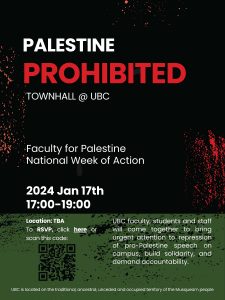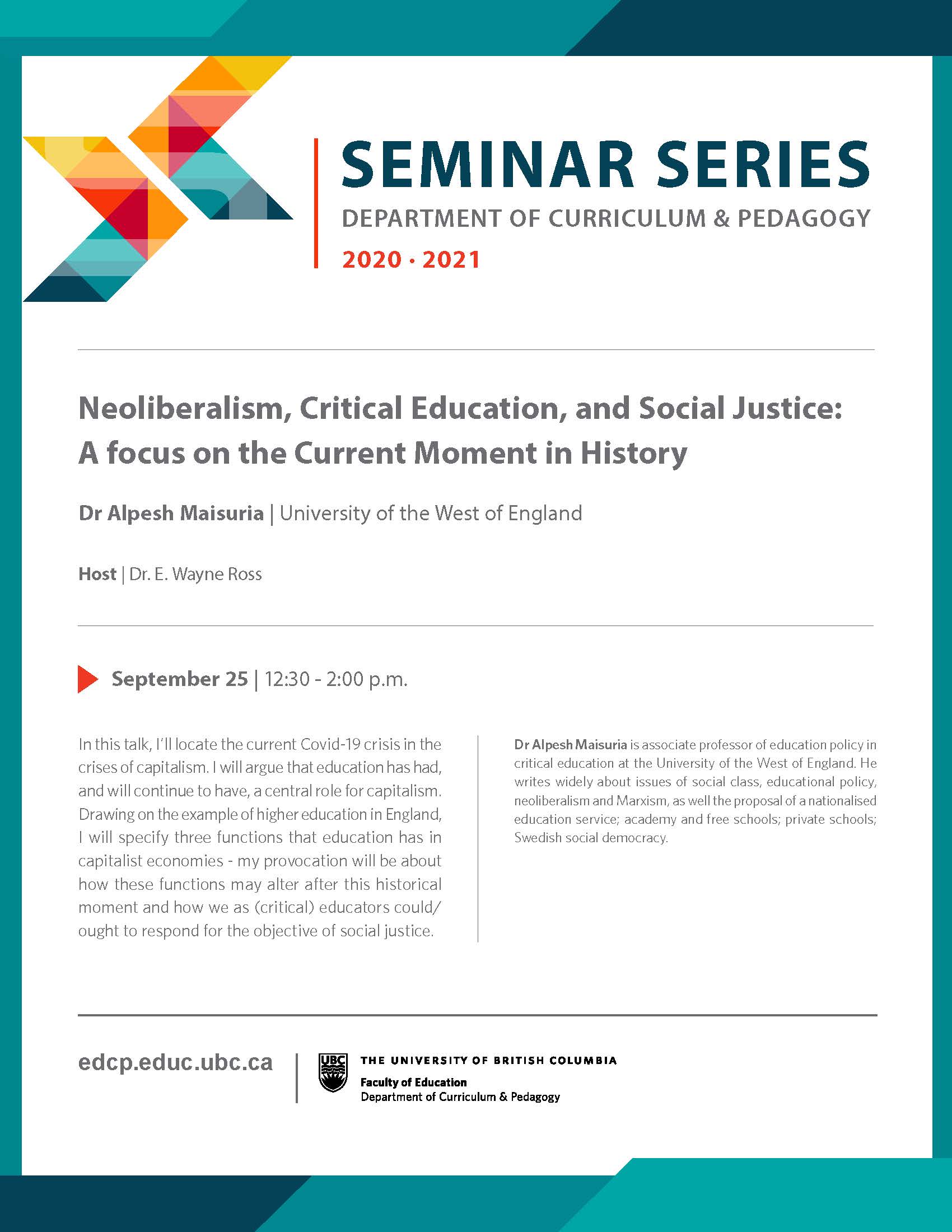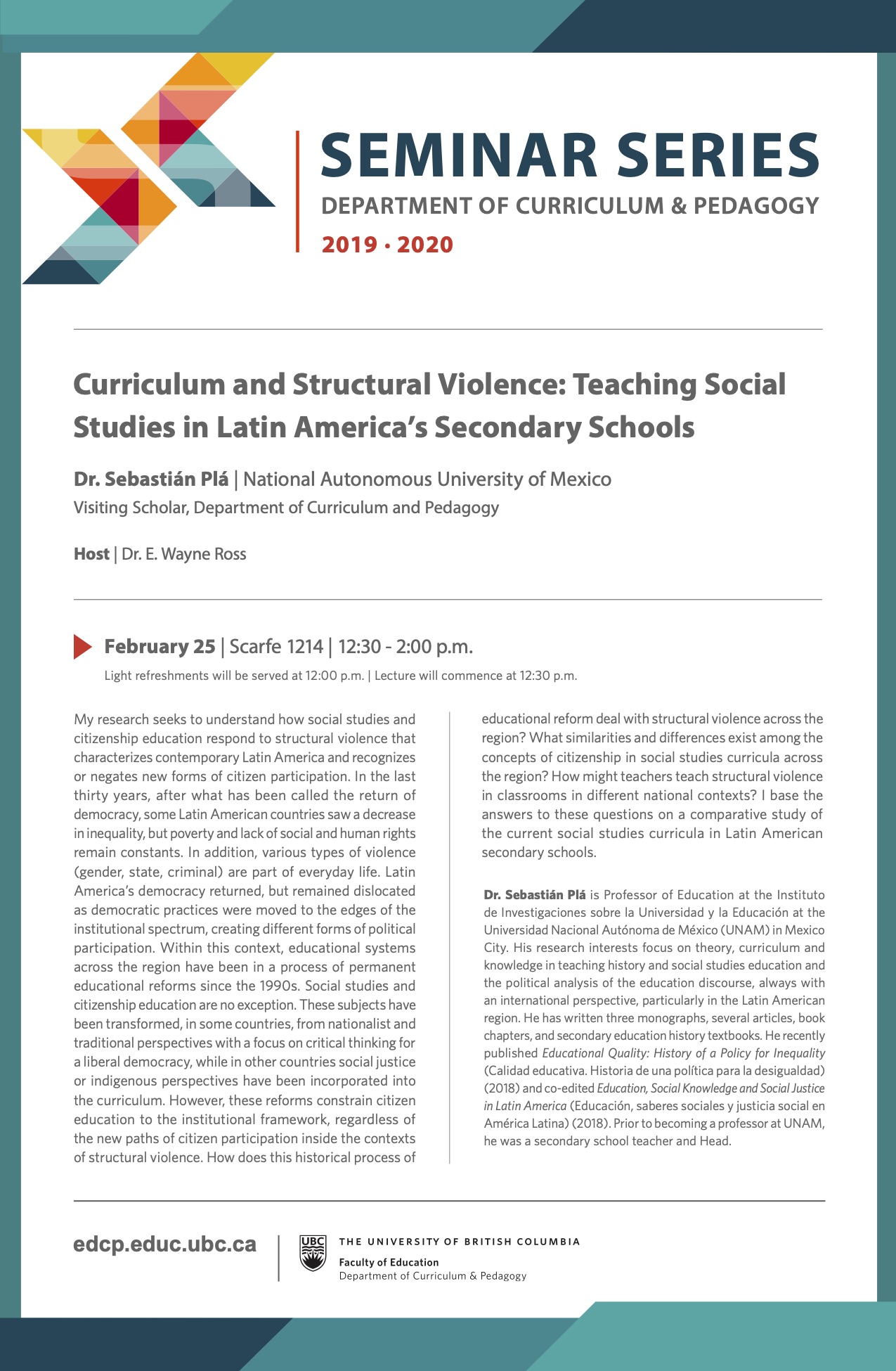UBC Faculty Response to scholasticide in Palestine
Message from Faculty for Palestine at UBC:
Israel has critically damaged or destroyed every one of Gaza’s 11 universities, over 370 schools, and countless libraries and irreplaceable archives. The destruction has been widely recognized as constituting scholasticide, a term coined by Palestinian scholar Karma Nabulsi to name the systematic destruction of Palestinian pedagogical institutions and murder of Palestinian scholars. Our colleagues in the Palestinian professoriate and their students are not only suffering from the immediacy of genocidal violence today, but also from the extent of the destruction are being denied a future for higher education in Gaza.
All the while, UBC continues to maintain institutional ties with Israeli institutions such as the Hebrew University of Jerusalem, Tel Aviv University and Technion – Israel Institute of Technology, which are deeply implicated in military research, development and training of the Israeli state and its armed occupation forces. The Palestinian Campaign for the Academic and Cultural Boycott of Israel (PACBI) has, since 2004, called for a boycott of Israeli institutions for these reasons, and for their discrimination against Palestinian students and violations of international law. Moreover, it is critical to consider the ways in which UBC’s study abroad programs in Israel are in direct and clear violation of UBC’s own non-discrimination policies because not all students are able to participate in them.
UBC’s silence and inaction is unacceptable. We urge the administration as a responsible educational institution to acknowledge the scholasticide in Gaza, and take steps to review and end ties with Israeli institutions that support genocide and occupation. Steps must be taken to build fruitful ties with institutions in Palestine that have been severely debilitated in the last few months and many decades of occupation preceding them.
Please find below, a statement crafted by the Palestinian-Canadian Artists and Academics Network (PCAAN), Faculty for Palestine Canada, and Jewish Faculty Network (National), and join the call for these demands at UBC by signing in support.
Joint Statement on Canadian Universities and Palestine
In light of the provisional measures ordered by the International Court of Justice (ICJ) against Israel in relation to grave breaches of the Genocide Convention, we are writing to you on behalf of Faculty for Palestine Canada, the Jewish Faculty Network and the Palestinian-Canadian Academics and Artists Network to request that your university take urgent action to protect and support educators and the education system in the Gaza Strip.
Over the past four months, we have witnessed Israel’s wholesale destruction of the post-secondary education system in Gaza, which is made up of over 625,000 students and about 23,000 teachers and professors, all of whom have been impacted by the war. As of 24 January 2024, Israel has killed 4,327 students and injured 8,109. Further, Israel has killed 231 teachers and administrators and injured 756. The number of students and educational staff killed in such a short period is unprecedented in the region’s history. Those students and teachers who have not been killed are among the more than 1.7 million people who have been forcibly displaced and who are living in overcrowded and unsanitary shelters or sleeping in the open. Like the rest of the population in Gaza, they are at risk of dying of hunger and disease, with no access to food, potable water, electricity, heating or medicine. While our current focus is on higher education, analyzing the broader picture of the Gaza education system reveals a devastating reality of long-term destruction, amounting to what experts term “scholasticide.” Israel has destroyed higher education infrastructure in Gaza on an unprecedented scale, the impact of which cannot be understood without also considering the massive destruction of elementary and secondary school education and staff. Taken together, this illustrates how a whole generation of students, teachers, and infrastructure is being destroyed.
Israeli forces have killed 94 members of Gaza’s higher education community, including numerous internationally respected scholars, deans, university presidents, and medical professors, who comprised part of the region’s intellectual leadership. These include Professor Sufian Tayeh, president of the NL Islamic University of Gaza, who – having won a prestigious fellowship – undertook research as a visitor at the University of Waterloo in 2021. Other scholars who have been killed by Israel are Professor Muhammad Eid Shabir, a microbiologist and Tayeh’s predecessor at the university for 15 years, Dr Said Al-Zubda, president of the University College of Applied Sciences, and Professor Refaat Alareer, who was co-founder of the ‘We Are Not Numbers’ project and one of Palestine’s most prominent intellectuals in Gaza.
Israel has systematically targeted all of Gaza’s universities. On 17 January, Israel blew up Al-Israa University, the last university left standing in Gaza after it was used as an Israeli military base for 70 days. Footage shared by the BBC shows the university being completely destroyed. This act of wanton destruction follows the repeated targeting by Israel of Gaza’s universities since the start of its military operation: the Islamic University was bombed on 11 October; the University College of Applied Sciences was bombed on 19 October; on 4 November, Israeli forces bombed Al Azhar University, the second largest university in Gaza, and this was followed by the destruction of the North Gaza branch of Al Quds University on 15 November. The medical school in the Islamic University was bombed on 10 December. The Palestine Technical College was also bombed and has been severely damaged. Al-Aqsa University was bombed on February 6th, 2024, destroying two buildings, and civilians sheltering in the university buildings were fired at.
In addition to the destruction of universities, as of mid-December 2023, 378 school buildings had been damaged, which amounts to more than 70% of Gaza’s education infrastructure. Israeli soldiers have filmed some of their acts of destruction, including one video that shows the moment the Israeli army blew up a UN school in Beit Hanoun in December. As a result of the destruction of Gaza’s schools, hundreds of thousands of children who have already been deprived of education for several months will not have a school to return to once Israel’s attacks subside. Moreover, Israeli forces have attacked multiple schools serving as temporary shelters, killing Palestinians who sought refuge in them. For example, in November 2023, Israeli forces attacked the UNRWA- run Al-Fakhoura and Al-Buraq schools, killing at least 50 people and wounding many others, while in December 2023, eyewitnesses attested to the execution of 7 people, including children, in attacks on Shadia Abu Ghazala School.
In addition to Israel’s scholasticide in the Gaza Strip, the Israeli army that is illegally occupying the West Bank has been actively dismantling the higher education infrastructure in the territory. Hundreds of checkpoints have crippled freedom of movement for students and faculty members. University campuses, such as Birzeit University have been closed since October 7th. In addition, even before the most recent wave of destruction, the Israeli army has frequently violated the sanctity of university campuses to arrest student leaders, most recently on September 27th at Birzeit University.
Israel’s killing of students and academic staff and its deliberate destruction of educational infrastructure constitute breaches of international humanitarian law, which requires Israel to take all feasible measures to spare civilians and civilian objects. It is self-evident that Israel has failed to comply with these requirements. As the UN Secretary-General noted in late October, ‘we are witnessing…clear violations of international humanitarian law…in Gaza’. Further, as South Africa argued before the ICJ, Israel’s attacks on education and students should be viewed as further evidence that Israel is deliberately inflicting on Palestinians in Gaza conditions calculated to bring about their destruction, in contravention of the Genocide Convention. As you know, the ICJ has ruled that South Africa’s case that Israel has committed genocide in Gaza is a plausible one.
In light of all of the above, we request that our university do the following:
-
Condemn Israel’s destruction of the education system in the Gaza Strip and call for an immediate ceasefire.
-
Express support for Gaza’s universities, staff and students. Universities Canada condemned the Russian invasion of Ukraine and expressed support for Canada’s “extensive linkages with Ukraine,” including “institutional partnerships, student exchanges, faculty exchanges and research collaborations.” Additionally, Universities Canada featured all of the individual university statements of solidarity with Ukraine on its website. Failure to do so now, in relation to Gaza, raises serious questions about the consistency of moral standards at Canadian universities.
-
Review all partnerships, including research cooperation, student exchange and study abroad programs, and funding relations, with Israeli educational and other institutions. End any relation that might be connected to ‘plausibly genocidal acts’ within the terms of the ICJ ruling. This includes, but is not limited to, universities that support the actions of Israeli armed forces and acts of genocidal incitement carried out by members of Israeli institutions, as well as universities that act as training grounds for soldiers.
-
Publicly condemn discriminatory and recriminatory actions taken by Israeli universities against Palestinians and Israelis who have criticized the war in Gaza. For an example of such conduct, see here.
-
Commit to setting up placements, fellowships, and scholarships for new students from Palestine, as well as hardship funds for students affected by the war on Enhance provision of placements for existing Palestinian academics and students, including through the Scholars at Risk Program Canada, which has enabled different university departments (for example, see here and here) to support Ukrainian researchers and students affected by the war in Ukraine.
-
Actively support Palestine’s universities through inter-institutional cooperation, including virtual exchanges, library sharing, and infrastructural support. Support Palestinian students, postdoctoral researchers and scholars fleeing the Israeli war on In response to Russia’s attacks on Ukraine, the Colleges and Institutes Canada (CICan) announced 150 scholarships for Ukrainian students coming to Canada as a result of the invasion; MITACS renewed its MOU with Ukraine and created 600 new internships for Ukrainian students and postdoctoral researchers fleeing the Russian invasion. The EduCan website offered specific information for Ukrainian students coming to Canada, and several universities announced new partnerships with Ukrainian universities (for example, see here and here). These scholarships, partnerships, and exchanges were backed by Canadian Government immigration and student visa initiatives. We expect Canadian Universities, Colleges, and the Government to support their Gazan and Palestinian counterparts in the same way.
Palestinian-Canadian Artists and Academics Network (PCAAN)
Faculty for Palestine Canada
Jewish Faculty Network (National)
 Follow
Follow





